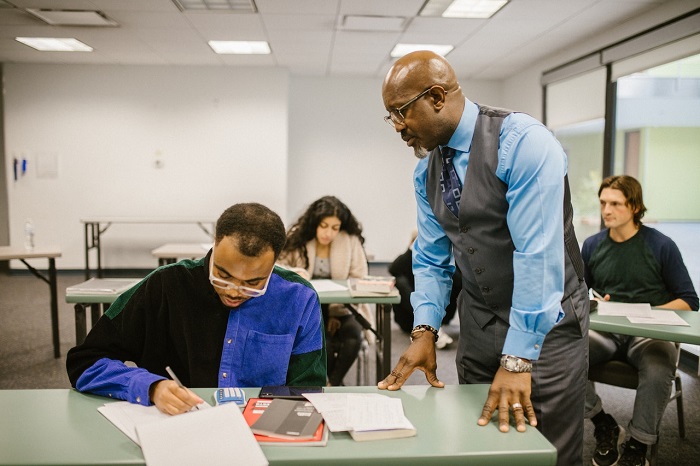Dev Ed/ABE Toolkit: Chapter 2 – Part 2

For unfamiliar terms, agency names, or acronyms, please see Glossary.
Navigate to sections of Chapter 2:
- Part 1 – Where to Start, Securing Campus and ABE Administration Support, Formalizing the Partnership, Funding the Partnership
- Part 2 – Selecting Instructors for the Partnership, Partnership Roles, Courses Suited to Collaboration
- Part 3 – Advance Planning, Revising Over Time, Sustaining Your Partnership
Chapter 2 – Part 2
The Dev Ed/ABE partnership, regardless of the level of ABE integration in courses, requires a unique distribution of roles and responsibilities among the partners. Making a clear distinction about how each person contributes to the course will help manage these concerns about overlapping or duplicative roles. Building trust is key.
Objectives:
- To provide readers with some guidance regarding the attributes and skill sets of instructors who are most likely to succeed when partnering in a Dev Ed or other class
- To dispel any myths that having an ABE partner is duplicative by helping readers understand the clear distinction between the partners’ roles, what each brings to the table, and then the importance of clearly defining the roles upfront before the collaboration begins
- To make readers aware of the importance of having a team of people from both ABE and the college, all of whom will play an important role in the partnership
- To help readers identify which courses lend themselves the best for a Dev Ed/ABE partnership
Selecting Instructors for the Partnership
Successful partnerships begin by selecting faculty from each program who are not only knowledgeable in the target content area, but also have a vested interest to collaborate. Ideally, the instructors who are selected to work together express a commitment to partner, demonstrate flexibility, and are team oriented. As the partnership grows and they gain experience working together, trust ensues. Without trust, people will hold back and be reluctant to share talents, time, and resources. A shared vision with long term goals brings focus to the partnership, promotes regular sharing of information, and requires accountability from everyone in the partnership.
Attributes, Competencies, and Experience of the Partnering Instructors
College instructors are content experts in their specialty area. They are highly trained to deliver content relevant to the needs of the learner within the confines of the course description and in alignment with sequential college courses. And many are trained in the pedagogy of teaching college-level courses. They have extensive experience working with multiple levels of learners, and they are particularly adept at explaining concepts contextualized to a student’s course of study. They are also proficient in their roles at collecting, analyzing, and reporting student data and outcomes, which lends itself to demonstrating the success of the collaboration.
 ABE instructors are certified K-12 instructors and are highly trained in teaching pedagogy as well as instructional methods and design. They are highly qualified to work with learners who function at less than a 12th grade education level. They have tools, teaching methods, and assessments which can help drive instruction that result in increased student retention, increased level gains, and a higher level of completion rates. ABE instructors often serve as a line of defense by closely monitoring student understanding of concepts, providing just-in-time support for instructional content, and creating a safe and supportive environment for students who might otherwise struggle navigating their classes.
ABE instructors are certified K-12 instructors and are highly trained in teaching pedagogy as well as instructional methods and design. They are highly qualified to work with learners who function at less than a 12th grade education level. They have tools, teaching methods, and assessments which can help drive instruction that result in increased student retention, increased level gains, and a higher level of completion rates. ABE instructors often serve as a line of defense by closely monitoring student understanding of concepts, providing just-in-time support for instructional content, and creating a safe and supportive environment for students who might otherwise struggle navigating their classes.
So which attributes, competencies, and experience is best to look for when selecting ABE and college instructors to work together? Here are some personnel attributes/skills likely to increase the partnership’s success and longevity. The desired partnership features practitioners who:
- Volunteer for the Dev Ed course(s) as this tends to lead to more successful partnerships
- Have a willingness and enthusiasm to engage in collaborative practices to explore innovative practices to meet changing student needs
- Have knowledge about the unique needs of developmental education students
- Have experience in working with lower-level learners (see Glossary), ESL/ELL learners (see Glossary), students with learning disabilities, non-traditional and those that need extra support in many areas
- Demonstrate flexibility in working with varying student needs and learning styles that encompasses the Dev Ed student and share the view that learning is an individual process
- Have a willingness to engage in crucial conversations about instructional/assessment/collaboration process and relationships
- Respect and value for the partner’s areas of expertise
- Demonstrate patience and persistence in the face of difficult circumstances – positive outcomes take time
- Possess clear and effective communication skills with ability to communicate with all stakeholders and interested outside parties
Defining Partnership Roles
The Dev Ed/ABE partnership, regardless of the level of ABE integration in courses, requires a unique distribution of roles and responsibilities among the partners. When being approached at the prospect of partnering, some faculty may be concerned about what seems like overlapping or duplicative roles. Making a clear distinction about how each person contributes to the class and to the teaching and learning process will help remedy these concerns.
 The partnership requires both instructors to maintain a sense of fluidity as intertwining skills and talents among the professionals emerge. It is important that all team members come together in the planning process to establish a clear delineation of the roles and expectations for each person. This work often is done at the early stages of course design, however, there are many instances where the course has already been offered in a more traditional model, and integration requires some minor tweaking of the design and delivery of the course to align it to a truly integrated model of instruction. In all cases, it is important that both instructors work together to come up with a plan before entering the classroom together.
The partnership requires both instructors to maintain a sense of fluidity as intertwining skills and talents among the professionals emerge. It is important that all team members come together in the planning process to establish a clear delineation of the roles and expectations for each person. This work often is done at the early stages of course design, however, there are many instances where the course has already been offered in a more traditional model, and integration requires some minor tweaking of the design and delivery of the course to align it to a truly integrated model of instruction. In all cases, it is important that both instructors work together to come up with a plan before entering the classroom together.
Instructor Roles
In the planning phase, both instructors should define which teaching methods are most appropriate. Once this happens, they can define their respective roles.
Certainly, college instructors are the content experts for their classes, and they often take the leading role in both instruction and design of college courses, whereas ABE instructors will often participate in class to monitor students for understanding, direct questions or provide answers, and establish opportunities for just-in-time support for the instruction taking place in class. There may be times when the instructors work simultaneously in the classroom with learners, and other times when the instructors work with learners outside of class time to clarify concepts, provide additional instruction, administer missed assignments or tests, etc.
The college instructor, through lecture or other teaching methods, covers the main points of the class, offering office hours to supplement student learning. ABE staff then assist with understanding of materials, offer lab time to re-teach skills that were taught in class and use additional methods to ensure understanding of materials, as needed. ABE staff are also available to help with homework completion and computer skills. One of the benefits of having ABE support is the ability of the ABE staff to offer additional time for students who need help with their Dev Ed, gateway, and pathway college class(es).
Communication is an important area where role clarification is needed. Questions you should address include:
- Who will students contact if unable to attend class?
- Who will send email or call students who are at risk due to missing class?
- How is that information shared among all partners?
NOTE: See Chapter 2 in Full Toolkit for additional detail about instructor roles.
Other Roles
In the colleges, there are many practitioners who need to have varying levels of awareness and interaction with the project. Because the work is often groundbreaking, includes an outside partner, and involves financial and support requests, many departments should have some level of connection ranging from awareness to intricate understanding of the partnership and associated best practices.
- President: Minimally aware of partnership, maximally on-board as a champion
- Deans: Awareness of a partnership if already underway, may attend a few meetings throughout the year, should have data/information regarding outcomes. Regarding the creation of a new partnership, ideally the Dean should be involved in the development and design aspects
- Department Chair: Should have significant knowledge of the partnership – supports the partnership with room and scheduling needs. Receives regular updates from the team, including from the cooperating partner
- Advising Staff: Awareness and willingness to promote ABE supported classes and aid in recruitment and proper student placement. Their role is to identify students who would benefit from extra support, either through testing, HS/ GED records or by self-identification. Outside of the Dev Ed classes, they advise or counsel students who are struggling in the classroom to use ABE services. They meet with the team routinely (perhaps weekly)
- Scheduler: Understand the ideal room assignments and can problem-solve ways to limit the unnecessary movement of the Dev Ed students. Keeping students in the same room for class and labs can significantly increase participation in the expanded learning support structures
- College Tutoring Services (integrated into some models): The Supervisor should be aware of partnership, be supportive of efforts, attend major planning meetings, provide staffing, and space support as needed. Professional Tutors when embedded in classes should attend class sessions, schedule and facilitate study groups, attend weekly collaborative meetings, schedule one-to-one tutoring sessions with identified students. When not embedded in classes, they schedule study groups, stay in contact with instructors about course content and identified student needs, facilitate special review sessions, and provide one-to-one support for students as identified by the instructional team
- Project Lead (select someone for this role): Manages the partnership (sets meetings, tracks data, problem solves during conflict or challenges), communicates to administration project updates and needs, maintains collaborative relationships during administration changes, has paid time set to do this work. Additionally, they facilitate regular meetings with instructors and appropriate administrators, and facilitate introductions with ABE and college offices that directly impact student needs, such as advising, counseling, disability services, food pantry, etc.
- ABE Manager: Aware of partnership. Should have some level of comfort understanding how the interactions work, may participate in some of the organizational planning meetings, receives annual report of outcomes, helps to address important funding challenges, particularly at start-up
- Site-level Supervisor: Should be actively involved in partnership, regularly attends check-in meetings with ABE staff, attends meetings with college administrators/upper-level partners. Also, manages ABE staff concerns/needs, problem-solves with project leads when conflict/challenges arise, ensures space is available for ABE instructors to work on campus, and endorses an agreement for sharing confidential student data with need-to-know educational partners
Courses Suited to Collaboration
 Partnerships between ABE and colleges occur on many levels; however, the Dev Ed courses and lower-level gateway courses tend to lend themselves to partnership because of their shared clientele and common instructional levels. Students who are appropriately placed in course work at this level typically function at or below a high school level. And they often encounter literacy issues that require remediation which makes them dually eligible for co-enrollment in both Dev Ed and ABE programming. The ultimate goal is to successfully transition students from a high school academic level into a college level academic level.
Partnerships between ABE and colleges occur on many levels; however, the Dev Ed courses and lower-level gateway courses tend to lend themselves to partnership because of their shared clientele and common instructional levels. Students who are appropriately placed in course work at this level typically function at or below a high school level. And they often encounter literacy issues that require remediation which makes them dually eligible for co-enrollment in both Dev Ed and ABE programming. The ultimate goal is to successfully transition students from a high school academic level into a college level academic level.
The following is a list of courses which lend themselves well to Dev Ed/ABE collaborations as you get started. As the relationship between college and ABE instructors grows, the trust and ability to work well together also grows. This can lead to additional classes that ABE instructors could potentially support to increase the confidence and competence in, and quicker advancement of, eligible students.
- Developmental Reading and English and Math courses are great starting classes and are courses where students can benefit from ABE’s academic support and resources. These classes are usually taken at the beginning of a student’s college experience, and it sets the stage for the continued support they can receive as they progress into more difficult classes. The students enrolled in these classes have typically had support in high school or have been out of high school for several years. Having the support of an ABE instructor can give students the confidence they need to begin and continue their college journey.
- Technical programs which do not have prerequisites. Many students struggle with the academic side of the program but do well in hands-on activities. ABE’s inclusion offers those students the extra support they need including help with course content but also critical thinking and navigation skills to help them throughout their educational journey.
- Any course where a lab or practicum accompanies the instructional period. Lab classes are used to deepen the understanding of course content and to model effective study skills and to create a system of successful student practices. ABE presence or ABE-led lab courses can help students gain these valuable skills.
- Gateway or entry level courses. The earlier in a student’s career that they can acquire requisite skills for success in college, the sooner and more likely they are to continue their college path.
- As the collaboration grows, sequential courses can also be excellent collaboration opportunities. If one or more members of the instructional team is present in the “next” course for the student, relationships with the person, and therefore the institution, are reinforced and enhanced.
- College Success Strategies. Partnering allows for additional student success skills, where ABE can support students including effective listening, managing time effectively, motivating and encouraging students, accountability, stress management and providing campus and community resources.
- Career Pathway Courses. Partnering allows for some specific contextualized learning (see Glossary) opportunities where ABE can support the college instruction by assisting students to develop the soft/professional skills valued by a particular industry.
- Classes with Opportunities for Peer-to-Peer and Small Group Learning. Partnering with ABE can provide greater opportunity to allow students to practice skills in a live setting and to promote growth as independent learners.
Part 2 Checklist
It is best to use this checklist with your partnership team to include minimally Dev Ed and ABE managers, and Dev Ed and ABE instructors who will be partnering. If you don’t yet have a team, please return to this checklist when you do.
At the end of this section, you or your team should:
- Have a good understanding of the skills and attributes of instructors to select for the partnership and ideally, have already identified the partners who will launch your first partnered course
- Understand that there is a distinction in the two roles of ABE vs. college instructor. Ideally, if both are already on the planning team, they have discussed what their respective roles could be. They may want to look at Chapter 3 first, the section which discussed and defines the five levels of integrated instruction
- Have solicited the participation of the various people named in the other roles section, to ensure needed resources and assistance are ready and in place when you begin the partnership
- Identified which courses at the partnering college your team will start with for the first partnered teaching experience
<< Back | Continue to Part 3 >>
Toolkit Navigation
View full Toolkit
You can view and download the full Dev Ed/ABE Toolkit below.
General Toolkit inquiries and/or feedback should be directed to:
- Russ Fraenkel, Consultant, dba Leading-Edge Collaborations, Inc., [email protected]
- Lesley Blicker, Consultant, dba DesignWorks, [email protected]